It might seem like rugby league, and State of Origin, exists in a bubble. By definition the contest is parochial and insular, which is both its major appeal and major drawback. State v state, mate v mate, to the exclusion of all else.
But what if the debates that surround Origin, particularly on a philosophical level, are ones that are shared globally, and are at the very forefront of thinking in terms of tactics and strategy within sports? It’s time to get real hi-falutin’ here, because that is very much the case.
When we talk about Queensland ‘getting Origin’, it’s largely a nonsense, but when we talk about the mechanics by which the Maroons seemingly reach their higher understanding of the concept, then we’re into the brass tacks of what might be deemed ‘sports philosophy’.
Queensland have this part of the equation down pat, and have done for years. They know how to win the best of three games, which are the only three games that matter, at least until we start again next year.
They know that Origin is both elite rugby league and stupid rugby league, an arena with the best players but the worst structure, where moments matter more than everything else.
In a sport where representative teams are largely sidelined – our international game tends to be very one-sided and held too infrequently to develop sample size – the Maroons have developed a greater understanding of the limitations of Origin and how they can make them work best for their ends.
It’s through a combination of tactics and, perhaps more importantly, the philosophy behind those tactics, that deliver them to victory time and again, despite near-permanently beginning as underdogs.
It’s hard to describe how this comes to pass in rugby league, because as mentioned, we don’t play anywhere near enough rep footy to use in-house references, but another sport provides the perfect example.
The debate on how to win representative games is one that has been raging at the margins of soccer for some time, particularly in the sport’s spiritual homeland of Brazil.
Needless to say, the Brazilians know a thing or two about futebol, having won the World Cup more times than anyone else, but have also seen their global stranglehold on the game slowly erode, first off the field and more recently on it.
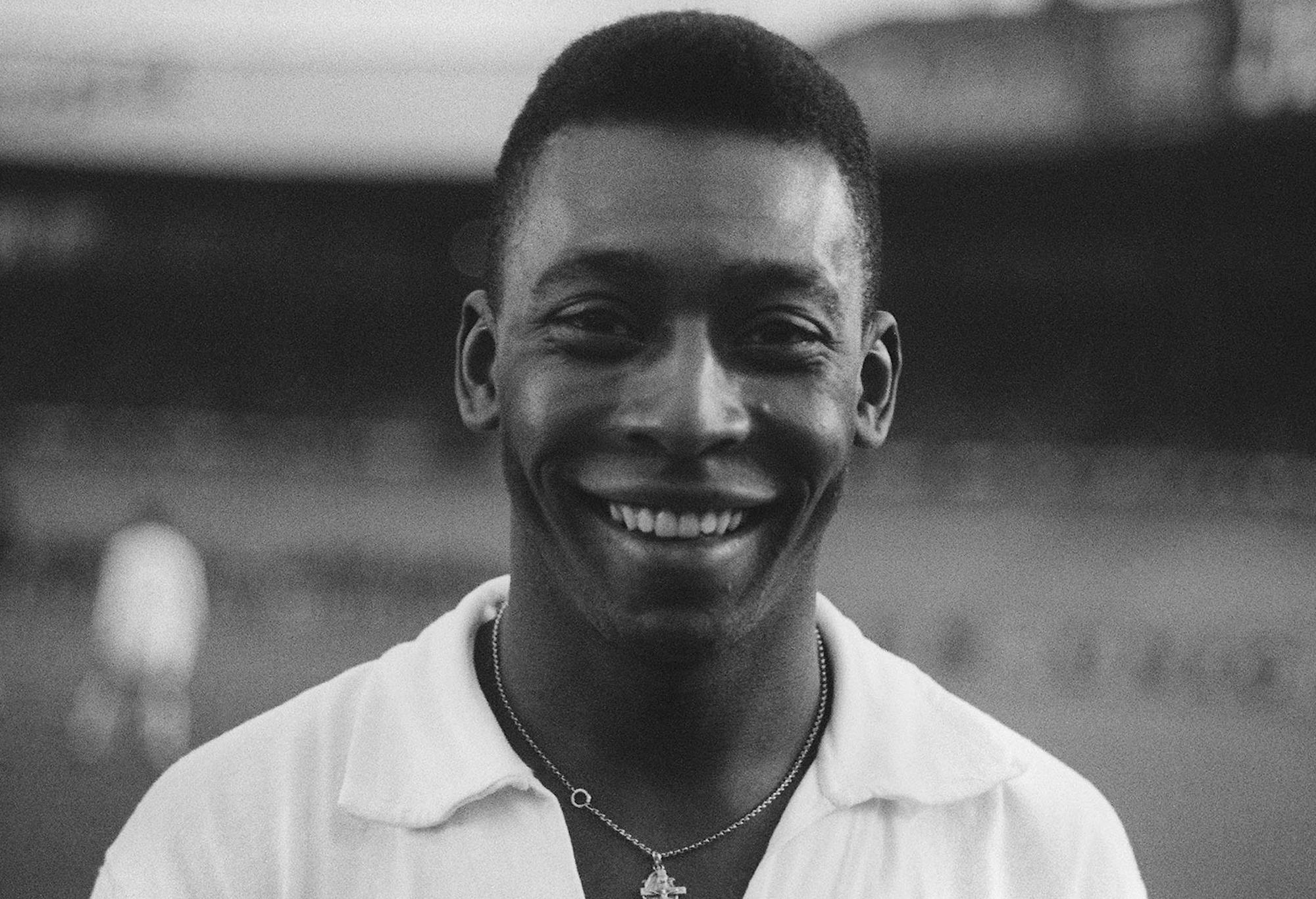
Pele was one of the greatest footballers in history. (Photo credit STAFF/AFP via Getty Images)
Even the most soccer-averse of readers will have a passing awareness of this: the striking yellow jerseys of Pele, the inventors of ‘jogo bonito’, the “beautiful game”, are now perennial underachievers at international level.
Having won the World Cup five times between 1958 and 2002 – and, in 1970 and 1982, had some of the most aesthetically-pleasing sides of all-time – their game is now in perpetual crisis at home and habitually embarrassed at World Cup.
They have departed at the quarter finals in four of the five tournaments since their last victory, save for the one time they got to the semis and lost 7-1 at home. For a nation of the size, history and cultural weight of Brazil, it’s a precipitous decline.
In 1970, Santos – that’s Pele’s club, by the way – were about as famous as Coca-Cola and Elvis, embarking on lucrative world tours that drew as many fans as any game in the European Cup (now UEFA Champions League).
In 2023, a Santos jersey would be about the fifth most likely to be seen on Coogee Beach among the Brazilian expat community, and unrecognised anywhere else beyond soccer tragics.
On a club level, they can’t keep pace with the force of money in Europe, and internationally, their players all play for European clubs and become conditioned to European ideas, which are seen as fundamentally opposed to those that made Brazil the powerhouse it once was.
This is where philosophy kicks in. Football coach and writer Jamie Hamilton coined the phrase ‘relationism’ to refer to the style of football historically played in South America, based around players reading each others’ movements and being able to improvise around each other to advance up the field.
It was cast against the ‘positionalist’ approach that is en vogue in the highest levels of the game in Europe, through the likes of Pep Guardiola at Manchester City and, seen as he’s ours, Ange Postecoglou at Celtic, where players manipulate space and zones on the field, rather than each other.
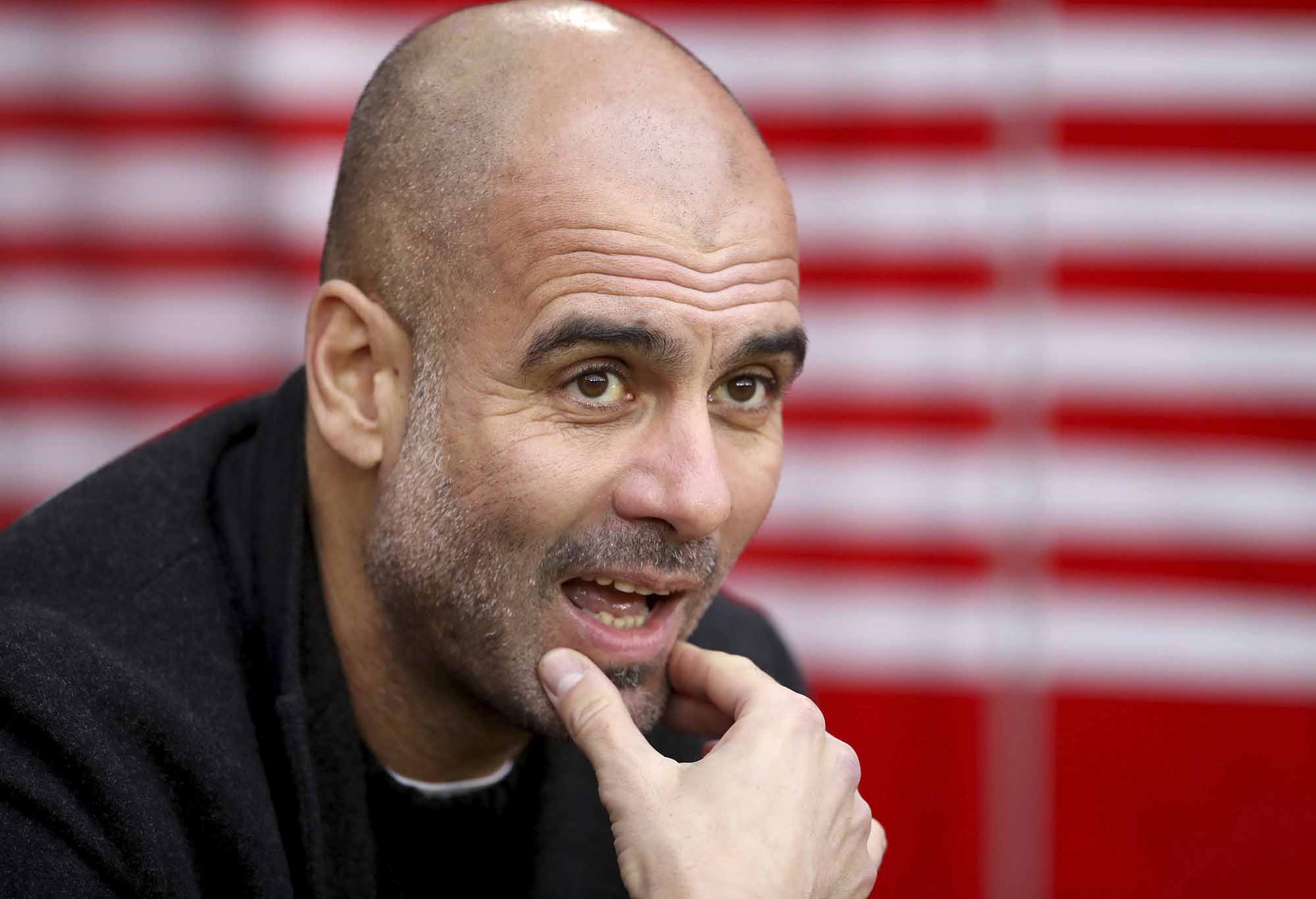
Pep Guardiola (Adam Davy/PA via AP)
This is the debate raging in Brazil: whether their national team would recover lost glories by playing the ‘relationist’ approach that made them great the first time over – and which is now being revitalised in the club game by the likes of Fernando Diniz, coach at Rio club Fluminense – or whether they would be better continuing to adopt ideas formulated in Europe.
The argument further augmented by the idea that Argentina just won the World Cup by doing exactly this, with their South American-style relationist play (helped by having Lionel Messi, arguably the best player since Pele) which conquered more structural opponents.
Realistically, one might now wonder what on Earth this has to do with State of Origin. In truth, it has everything to do with it, particularly in 2023, perhaps more so than any year.
The battle between ‘position’, that is, where players are on the field and how they interact with space, versus ‘relation’, where players are less bothered about where they are and more about who they are working with, will be played out in real time, between the ultimate relationists, in maroon, and the aspirational positionists, in blue.
Queensland will be the ones playing a style designed to work around a group that can free-form, whereas NSW will be attempting to graft club ideas into the rep arena.
Currently, the elite of the NRL sees two highly-distinctive, highly-systematised philosophies at work, and both of them in New South Wales.
There’s the Penrith school, which you will recognise as based on backline metres, service through a ball-playing lock and prioritising the defensive roles of middle forwards.
There’s the Souths school, with very structured pinning movements – again using the ball-playing lock, but not exclusively – with defined, automatised shift plays and, in contrast to the Panthers, prioritises the yardage roles of middle forwards.
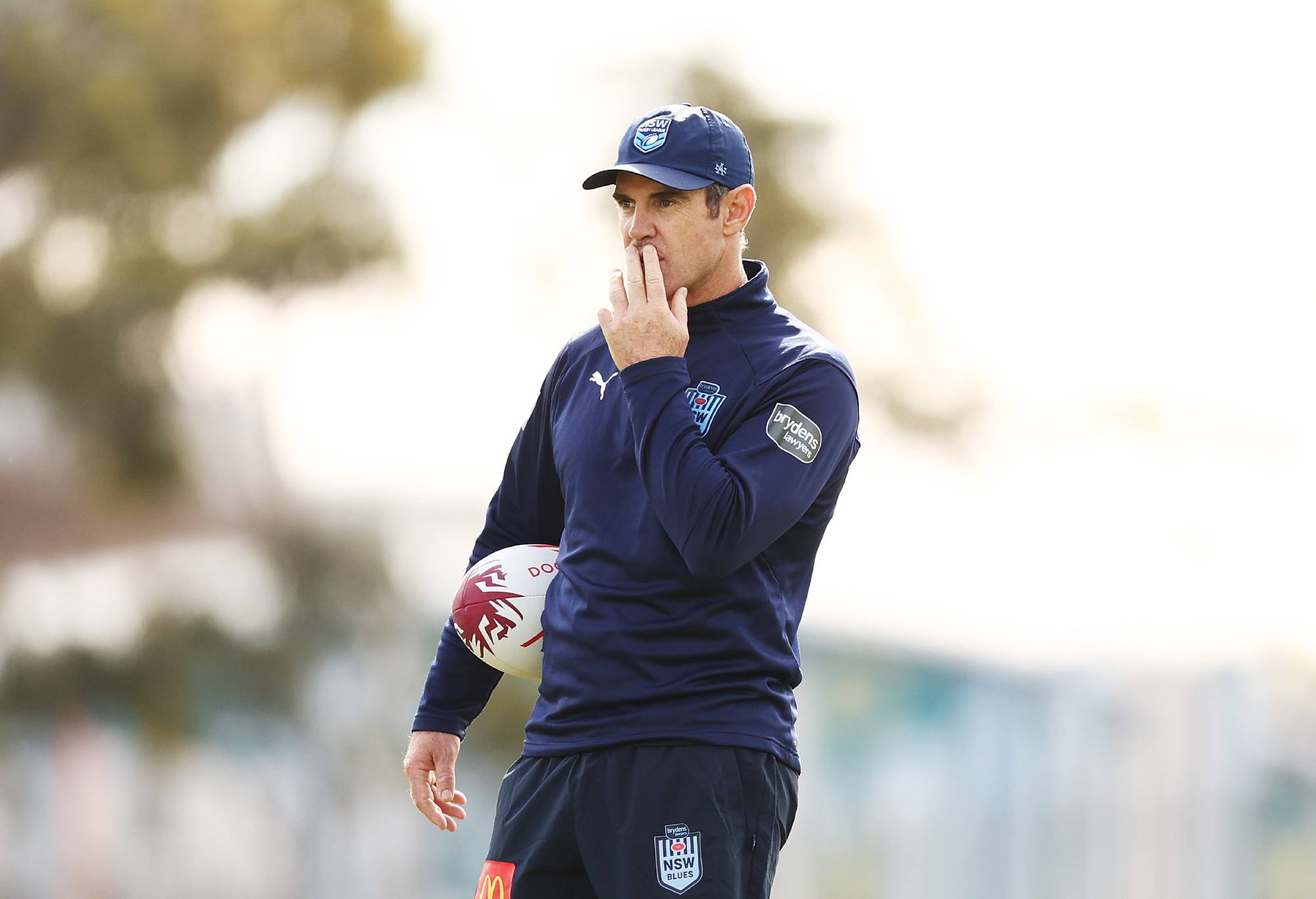
Blues coach Brad Fittler. (Photo by Mark Metcalfe/Getty Images)
One could add the Cronulla and Parramatta schools, too, which are similarly ideologically organised, but perhaps not at the peak of the coaches’ cycle yet, or in the Eels’ case, at the end of theirs.
No surprise that the Panthers and Souths are currently the two best club sides in the competition, despite injuries, despite strength of schedule and everything else.
These provide the bulk of the players from which Brad Fittler selects his team. Evidently, given his selection of seven from the Panthers, we know this is how he is going to play.
Compare Queensland’s Billy Slater. As a player, he was part of a Maroons set-up that developed cohesion predominantly through relationist aspects, with the great generation of Melbourne-based players working under Craig Bellamy and the rest under Wayne Bennett, two all-timer coaches who have always favoured improvisational play within specified boundaries.
As a coach in his own right, Slater has also been able to draw on this: for his spine, this is their natural game. Cam Munster, Harry Grant and Ben Hunt do this every week at club level in a way that no Panther or Rabbitoh does.
Even Latrell Mitchell at the Bunnies, seen as a ‘moments’ player capable of individually dominating a game, does so because he has an entire system dedicated to getting him the ball at the right time in the right place, an arrangement fundamentally different to what Munster does.
Slater knows this, because he had that licence too in his time at the Storm, and he leans into it because he can, given the talent available to him in key positions.
Debutant Reece Walsh aside, the Maroons boss has been able to draw on a core group of playmakers that date back to Grant’s entrance to Origin in 2020 and, in the case of Munster and Hunt, back to 2017.
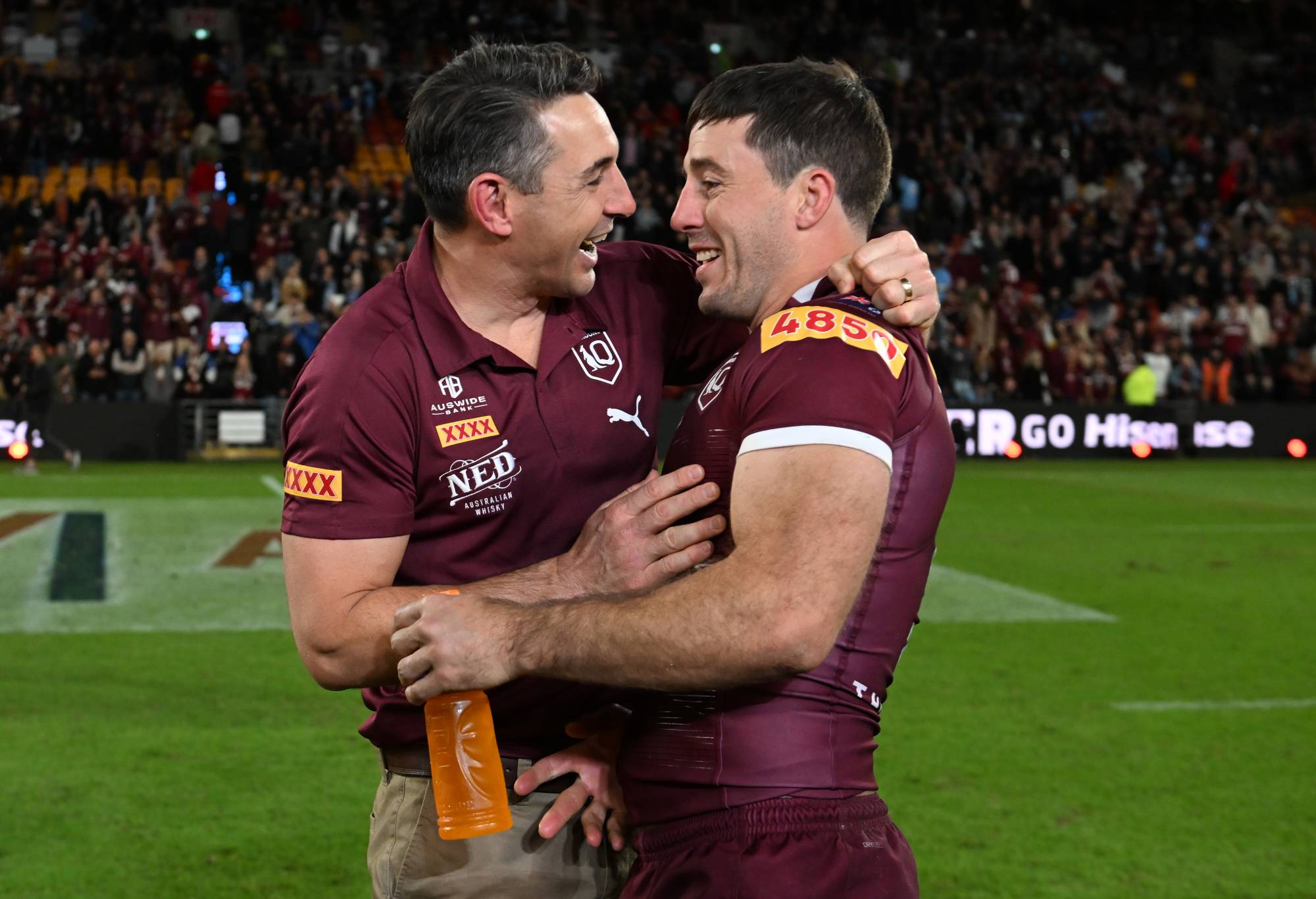
Billy Slater and Ben Hunt celebrate. (Photo by Bradley Kanaris/Getty Images)
The policy of picking a core of consistent players with several, select mavericks who can improvise is pure relationism.
The contrast is stark. Though NSW lost last year, Fittler has gone back to the well of Panthers players, and no fewer than six of them – seven if you include ex-Panther Api Koroisau – will line up for the Blues on Wednesday night in Adelaide.
The Blues coach, for the second year running, has staked the farm on the system-based cohesion of the Panthers being able to trump the more improvisational Maroons.
It creates an interesting thought experiment: who would win between the 2022 Penrith Panthers and Queensland? The rep side would have the better players, sure, but in rugby league, system can beat talent a lot of the time. Just ask the Dolphins.
Origin footy, and representative games in general, are time-poor and give little chance to build systems within the group. The choice is either to play without a one – or at least, to plan for players to have functional independence within a loose set of principles – or to import one from elsewhere.
At the World Cup, various coaches described this as platform-building, where you could get basics into a side but no finesse. Invariably, that resulted in relying on someone to do something spectacular. For Queensland, that has worked time and again.
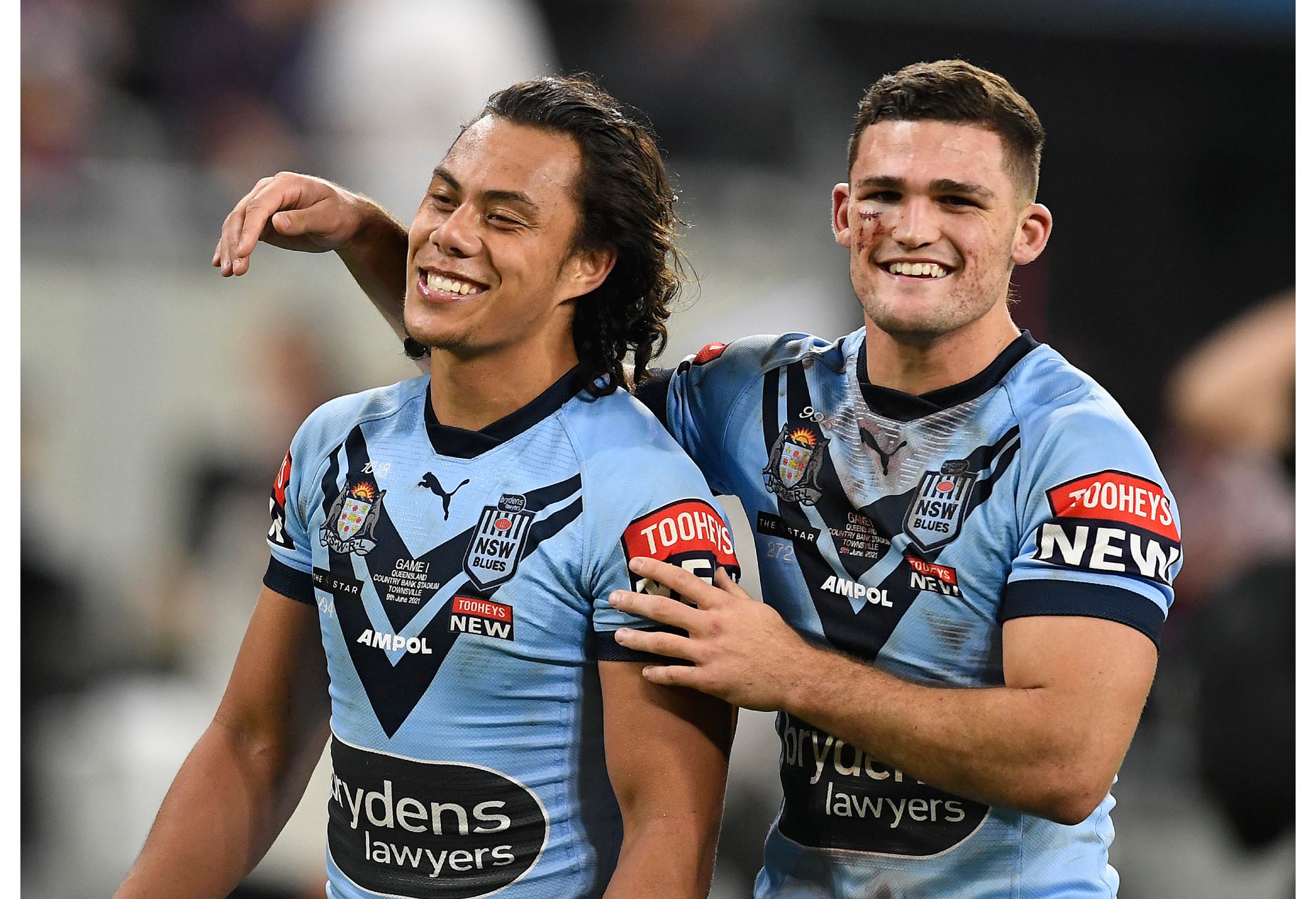
Nathan Cleary and Jarome Luai. (Photo by Ian Hitchcock/Getty Images)
NSW could have done this, too. Instead of Jarome Luai, who really only works as the third part of a system headed by Nathan Cleary and Isaah Yeo, they could have picked Cody Walker, as close to a Munster-clone as NSW have.
Damien Cook could have been the spark plug that Grant is for Queensland, they could have put Matt Burton in at centre, a true wildcard with his big frame and kicking, or Jesse Ramien, who does fundamentally better unstructured work than Penrith’s Stephen Crichton.
This isn’t to say that they should have, by the way, just that they might have. Fittler, too, could have leaned into a totally different system and picked a spine of Souths players with Cleary at halfback. If the Blues lose this year, perhaps a new coach will do exactly that.
It’s ironic given the discussions around whether Queensland ‘get Origin’ better that their philosophy might not be around the specific arena, but just the limitations of the form.
NSW’s intention, despite results to the contrary last year, appears to be grafting a functional system from clubland and making it work at rep level.
Form versus function, however, might be a philosophical discussion too far for a sports column. Lucky for us, we get to play out that debate in real life over the next few weeks.

































































































